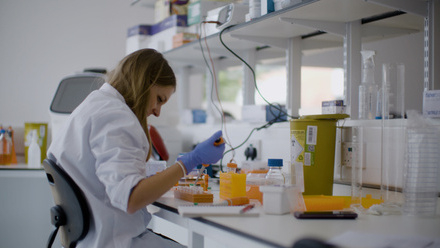New evaluation model finds widespread adoption of cell and gene therapies may unlock billions
London, UK - Monday, 20 October 2025 - A new report published today by the Cell and Gene Therapy Catapult (CGT Catapult) and the Office of Health Economics (OHE) presents a new method of quantifying the economic impact of healthcare innovations, such as cell and gene therapies. It evaluates the economic gains that the large-scale adoption of advanced therapies could provide for individuals, the NHS, and the wider UK economy - finding substantive gains across all measured areas. The research, part-funded by Innovate UK, indicates that wider adoption advanced therapies could unlock billions for the UK economy.
Cell and gene therapies act by treating the root causes of disease, rather than symptoms, providing long-term relief from serious debilitating and fatal conditions. They are a fundamentally different class of treatment that offers the potential for durable, life-changing health outcomes often through a single intervention. The wider use of this type of medicine has implications not just for individual patient health, but also for how value is generated and distributed across the wider NHS and the economy. This includes increased productivity, reduced absenteeism, and enhanced quality of life for patients and caregivers.
This new study, which is aligned with HM Treasury evaluation methods, analyses the projected value of treating four specific conditions with cell or gene therapies for 10 years following implementation. It examines four rare and prevalent conditions: acute lymphoblastic leukaemia (ALL), acute myeloid leukaemia (AML), beta-thalassaemia (BT), each of which have launched cell and gene therapies; and Alzheimer’s disease (AD) which has multiple cell and gene products in clinical development.
In every case identified in the research, substantial economic benefits were demonstrated, beyond individual health gains. These benefits would not be picked up by conventional cost-benefit analyses focused on the existing relative evaluation of medicines. High prevalence conditions showed the potential for economic gains measured in billions of pounds, with the rare conditions also demonstrating potential for significant gains to the economy.
When the individual conditions are considered, key findings include:
- For beta-thalassemia, a rare condition, the largest economic impact is for the health service, with potential savings of £74 million, and broader societal gains of £51 million as a result of patients no longer needing blood transfusions over the course of their life.
- ALL, a rare condition most commonly seen in children, provides £11 million in cost benefits for individuals. This demonstrates the value of these therapies even for small patient groups. This is a conservative figure as the method does not account for benefits beyond 10 years when children would become economically active adults.
- AML, a rare cancer also common in children, delivers individual value of £583 million, as well as NHS offsets of £463 million.
- Future advanced therapies for Alzheimer’s, a prevalent neurodegenerative disease, could provide benefits of £39.6 billion for individuals and their carers, resulting from extra years in work and reduced levels of care. It could also save the health and care service £19.9 billion and could add £21.5 billion to the wider economy.
The methodology aims to determine the value of a medical intervention to society as a whole and could be adapted for use alongside the current standard health benefit calculation within the Health Technology Assessment (HTA). It adds a substantial extra perspective to the HTA, which is currently not designed or intended to account for the wider economic (macro) benefits.
By demonstrating the holistic contribution of cell and gene therapies to the UK economy, this analysis presents a case for a system-shift towards the accelerated adoption of these therapeutics, focused on disease modification or cure, rather than long-term treatment. In recognising the value of cell and gene therapies, and supporting this system-shift, the UK could realise these benefits to health systems, labour supply, and economic growth at a time when it is acutely needed.
Matthew Durdy, Chief Executive of the CGT Catapult, said:
A system-shift to ensure advanced therapies are routinely incorporated into care pathways would not only provide life-changing health benefits, but also unlock billions in value for the wider economy, while supporting the government’s plans for increased productivity and growth.
This research provides a tool for decision makers to use when considering disruptive medical innovations, to factor in benefits that go well beyond what is currently considered. It provides a framework to understand the impact on society, rather than simply the direct healthcare benefits.
We hope this report generates support from healthcare investment decision makers, and fosters collaboration across and investment into the sector, to ensure advanced healthcare innovations can be accessed by all in need, generating benefits for both patients and wider society.
Grace Hampson, a Director at the Office of Health Economics and lead author of the report said:
Cell and gene therapies aren’t just health interventions. Their benefits go beyond direct clinical outcomes: they have the potential to alleviate pressure on the NHS, increase productivity and drive economic growth.
We found that widening access to cell and gene therapies yields substantive societal benefits, even when only health-related outcomes are counted. But this is only one part of the story: when we estimate the non-health related benefits of cell and gene therapies, like industrial expansion and highly skilled job creation, the benefits to the wider economy will be even greater.
Our research valued benefits across patients, care systems, and the wider economy—and aligned the analysis with HM Treasury’s Green Book—to offer a robust evidence base for policymakers to consider the value of a broader system-shift towards cell and gene therapies in the UK.
Read the full press release or find out more about CGT Catapult's study.






